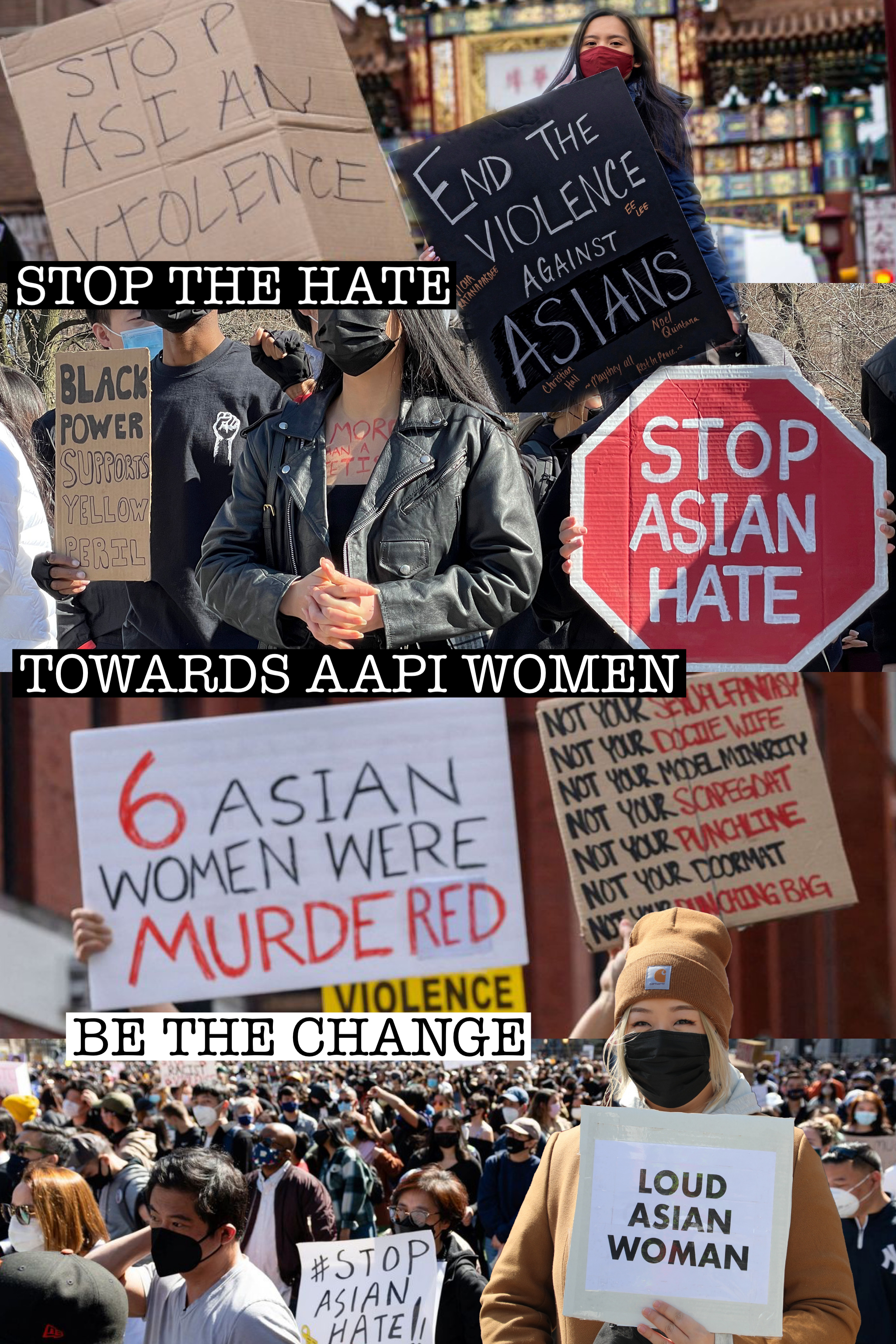
Trigger Warning: Violence, Systematic Racism
Self-Portrait / Digital Artwork by Madison Zeng
Observed throughout mainstream media, the rise of hate crimes directed towards women of Asian descent is not a circumstance that is of revelation. Situations surrounding hateful acts and harassment are neither predictable nor warranted. New Yorkers and activists face wonderings about the attributes that intrigue the motives of offenders and in correlation to mental health decisions. Safety concerns of Asian and Asian American women in the U.S. are in regards to public health. Organizations such as Stop AAPI Hate track incidents of discrimination against Asian Americans and Pacific Islanders in the U.S. This organization found that 68% of the incidents reported between March 2020 and March 2021 targeted women. Observed from these statistics, Asian and Asian American women are particularly vulnerable to intentional attacks.
What can be established as a hate crime?
- A hate crime is a criminal offense against a person or property motivated by an offender’s bias against a race, religion, disability, sexual orientation, ethnicity, gender, or gender identity.
The justification for this can be derived from gender bias and stereotypes in correlation to the racism of Asian American women who are perceived as being more vulnerable.
According to the observations of the American Psychological Association, “Largely, Asian American women are thought of as faceless, quiet and invisible, or as sexual objects. In addition to the myth of the ‘Model Minority’ and the ‘Forever Foreigner,’ these depictions and others have persisted in the media and popular culture.”
Provided from the same research, the American Psychological Association has done a study to better understand the effects of discrimination on the lives of Asian American women in the U.S. Participants were asked about their experiences with discrimination. The researchers identified 15 types of discrimination, 6 of which were specific to how race and gender interact in discrimination toward Asian American women in particular. These conclusions demonstrate that stereotypes contribute to experiences of “marginalization, invisibility, and oppression” that these participants have experienced in the past and continue to face in the present both in their professional and personal lives.
Current Events
In early March, 7 Asian women were attacked within 2 hours in New York City.
Christina Yuna Lee was a victim of a stabbing. On a late night in February, Christina took a car back to her NY Chinatown apartment where a man followed her up six flights of stairs and stabbed her dozens of times to her death. Her killing evoked fears in the city’s Asian community which was already experiencing a rise in attacks during the pandemic.
In a parallel pattern, Michelle Go was pushed onto NYC subway tracks and died as a result. Michelle Go was a 40-year-old professional and Asian-American woman who was pushed into the path of an oncoming subway train by a homeless man. Incidents like this are anxiety-inducing for Asian American (women) who realize the possibility of a similar situation happening to them. Since the beginning of the pandemic, the Asian community had been blamed and scapegoated for causing or being in relation to the origin of the virus.
In an account by NBC News, “Groups are heeding that warning, and at the same time acknowledging that some Asian Americans are saying that their daily fears were realized in the attack and that they saw themselves in Go — particularly women.”
GuiYing Ma was struck repeatedly in the head with a rock last year in Queens and slipped into a coma after sustaining injuries from her critical condition. This attack left permanent damage to the right side of Mrs. Ma’s brain.
Asian-American hate has been perpetuated through premeditated bias and harmful actions against their daily living. Investigators analyze the characteristics of the victims who come from various class backgrounds and were at separate public premises when they were attacked. It is unclear if their perpetrators have expressed clear anti-Asian bias however, it is understandable why these high-profile incidents would make American women feel on edge. 74% of Asian American and Pacific Islander women reported having experienced racism or discrimination in the past year. In reflection of this, people are convincing leaders to address public safety for the protection and welfare of Asian-American people. Despite the threats experienced and deserving to be addressed, advocates and elected officials feel unable to solve the problem because the pattern of attacks are vague and the true motives were in-explicit.
As for the case of Christina Yuna Lee and Michelle Go, it is uncertain if their offenders have documented histories of anti-Asian bias. Many of them have records of being in and out of facilities and mental health treatment centers. With their previous criminal record, many think that the suspects should never have been allowed on the streets in the first place.
Final Thoughts
Racism and sexism against Asian American women have intensified with the beginning of COVID-19. The pandemic has heightened the violence and harassment against Asian American women. It is important to acknowledge the history of fetishization, colonization, sexism, and racism that has always existed before Coronavirus. Hate crimes have existed and been reported since before the virus. Hate is not limited to violence and harassment. It is both exhausting and unfair for AAPI women to extend their voices, time, and energy to be vigilant in speaking up for themselves and others. Every victim should have an advocate and it is unjust to have to be both for oneself. Victims and AAPI women deserve and need healing from the prejudice they wrongfully and commonly receive.
Ways Asian-Americans can protect themselves:
- Be aware of your surroundings
- Carry protection such as alarm devices and pepper spray
- Resist provocation
- Do not travel alone
- Communicate with others about your location
What YOU can do to help fight the violence and racism:
- Speak out if you witness a hate crime or incident
- Report hate crimes that you notice
- Check-in with Asian American peers, in particular with women and elders
- Educate yourself on the history of Asian American discrimination
- Apply your knowledge to advocate for awareness
- Provide Community Resources
- Reach out to elected officials
- Donate to organizations that provide resources and assistance to the Asian-American community
We can all play a part in preventing AAPI hate from occurring through built awareness, education, and affirmative action to create change. We need resources that are dedicated to local communities such as community safety programs as well as in-language support for those in need of services and experiencing language barriers.
Increased resources are also essential to take the burden off the AAPI community by speaking up and advocating alongside them and taking action in solidarity. Solidarity can be defined as the unity and/or agreement of feeling or action, particularly among individuals with a common interest. This can be perpetuated through mutual support.
Stop AAPI Hate is a leading coalition addressing the rise of anti-Asian and Pacific Islander racism in the U.S. This organization was co-founded in March 2020 by Chinese for Affirmative Action, the Asian Pacific Policy and Planning Council, and Asian American Studies Department at San Francisco State University. For their efforts, Stop AAPI Hate has become profoundly known as a nationwide movement to end the racial discrimination and violent attacks against AAPI communities by working hard to break the silence and address the challenge of anti-Asian racism and xenophobia.
The coalition follows a five-pronged approach:
- Serving as the leading aggregator of anti-Asian and anti-Pacific Islander hate incidents
- Offering multilingual resources for impacted community members
- Providing technical assistance from rapid response to preventative measures
- Supporting community-based safety measures and restorative justice efforts
- Advocating for local, state, and national policies that reinforce human rights and civil rights protections.
ACT NOW and support Stop AAPI Hate here: https://stopaapihate.org/actnow/
Education and Support
Policing can only go so far… The Prison Abolition Movement is a network of groups and activists that seek to reduce or eliminate prisons and the prison system with systems of rehabilitation that do not place a concentration on punishment and government institutionalization.
Education is a learning process and it is important to persistently speak and teach about the prominent issue of hate crimes directed towards vulnerable populations, in particular, AAPI women.
Community Centers such as Minkwon Center in Flushing, NY provide educational programs to bring together immigrant high school youth to learn about issues of injustice in their communities and brainstorm potential solutions. The Youth Empowerment Program at Minkwon Center is an effective example of encouraging and educating the future generation of leaders to create change upon social issues that may not be discussed in their institutional schools. Through training, community outreach, education, and workshops, youth are able to gain a deeper historical and political understanding of their (and their families) experience in America. I am proudly a participant of this inclusive program and work to learn about social change and discuss potential impacts and solutions.
Read more about Minkwon Center here: http://minkwon.org
Other Resources
A culmination of Anti-Asian Violence Data Collection Projects can be found here:
https://www.aapicovid19.org/resources
Report an Incident with Stop AAPI Hate: https://stopaapihate.org/reportincident/
Toolkit for Addressing Anti-Asian Bias, Discriminiation, and Hate:
https://www1.nyc.gov/site/cchr/community/stop-asian-hate.page
Resources for Mental Health:
The Centers for Disease Control and Prevention has provided free and confidential resources:
https://www.cdc.gov/mentalhealth/tools-resources/individuals/index.htm
Article by Madison Zeng; Written in April 2022
